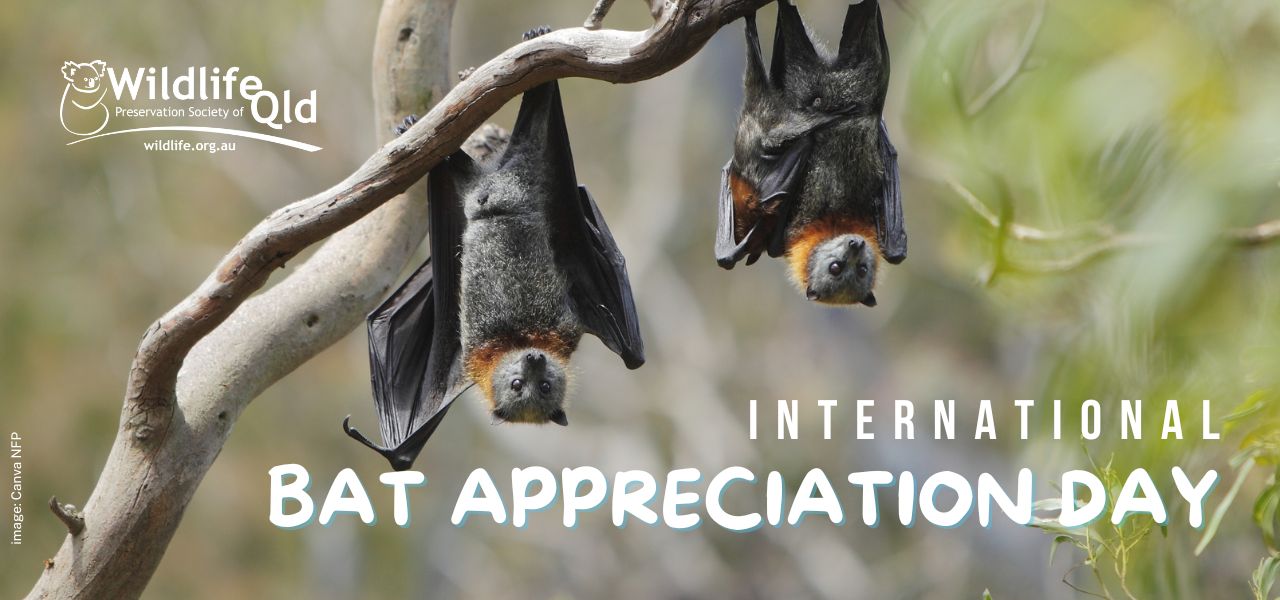
updated 17 April 2024
Today is International Bat Appreciation Day 2024, a day to celebrate and learn more about the vital role bats play in nature.
There are more than 1,200 bat species in the world, accounting for almost a fifth of all mammal species. Bats display an abundant diversity of dietary practices, varying from species that feed on insects and small fish to species that feed on fruit, nectar and pollen.
- Microbats (Microchiroptera) — known as insect bats — play an important role in controlling insect numbers, including a range of pest species and disease-carrying mosquitoes, by eating around 40% of their body weight of insects each night.
- Megabats (Megachiroptera) — known as flying-foxes or fruit bats — play an important ecological role in dispersing the pollen and fruit of many native trees.
Find out more fascinating facts about flying-foxes.
How we help flying-foxes
Every summer for more than 30 years, Wildlife Queensland’s Batty Boat Cruises have introduced thousands of people to the fascinating world of flying-foxes. This successful education initiative provides an opportunity for everyone to see flying-foxes in their natural habitat and learn why they are so important to our environment. Proceeds from the cruises fund bat conservation and support Bat Conservation and Rescue Qld Inc. (BCRQ) carers.
A ‘Batty’ thank you to BCRQ
This International Bat Appreciation Day, we’re pleased to donate part of the proceeds from the 2023/2024 Wildlife Queensland Batty Boat Cruise season to BCRQ.
BCRQ is a non-profit volunteer organisation that is devoted to preserving flying-fox and microbat populations in Queensland through its efforts in rescue, rehabilitation, and education.
Volunteers from BCRQ play a vital role in Wildlife Queensland’s Batty Boat Cruises by generously contributing their time and expertise. They provide valuable information to passengers about the unique flying-foxes found in Queensland, and passengers can also meet orphaned baby flying-foxes and their BCRQ caregivers onboard each cruise.
Melinda Brennan, President of BCRQ, expressed her appreciation for the donation from Wildlife Queensland.
“Thank you, Wildlife Preservation Society of Queensland, for the wonderful donation to Bat Conservation & Rescue Qld Inc on Bat Appreciation Day!
“Once again, this year, we were inundated with hundreds of vulnerable grey-headed flying-fox orphans. It is suspected that starvation may have contributed to this because their mothers weren’t able to produce milk. Additionally, we faced another challenge this year with paralysis syndrome, which occurred a month later than last year. This syndrome is the same one that affects lorikeets.
“Your continued education and support via the Batty Boat Cruises are vital in helping the BCRQ volunteer team carry on our work for bats.”
Wildlife Queensland is proud to support BCRQ in its efforts to protect and conserve Queensland’s bat populations.
How you can help bats and support bat conservation
- If you find a sick or injured bat: Don’t touch the bat. Call 1300 ANIMAL or contact your local bat rescue group. They will be able to notify someone who is vaccinated and trained to handle flying-foxes. Additional information can be found on the BCRQ website.
- Support bat conservation:
o Find out more about BCRQ and Wildlife Queensland’s Batty Boat Cruises.
o Support Wildlife Queensland’s conservation efforts by purchasing our fabulous bat-related books and toys in the Wildlife Queensland online shop. - Encourage flying-foxes to come to your backyard by planting lillipillies, small eucalypts such as the Plunket mallee (Eucalyptus curtisii; bloodwood (Corymbia intermedia) and other nectar-rich trees and shrubs.
- Create wildlife-friendly fences: Flying-foxes often get caught on barbed-wire fences. Mother flying-foxes that are carrying babies are the most vulnerable. Read our Wildlife Blog to find out how you can make fences fauna-friendly.
- Learn more about flying-foxes.
